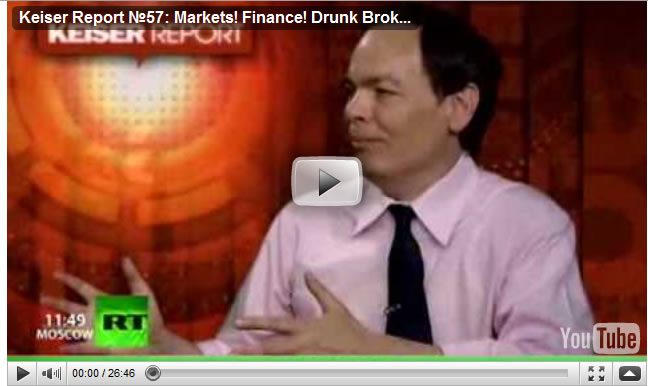Should Taxpayers Continue to Subsidize Goldman Sachs's Alleged Obscenity?
Stock-Markets / Credit Crisis Bailouts Jul 07, 2010 - 11:29 AM GMTBy: Janet_Tavakoli
 The U.S.'s Financial Reform bill is over 2,000 pages. It includes exemptions and lots of opportunities to create loopholes. Behavior that caused our ongoing global financial crisis is guaranteed to continue, if we don't have swift and effective deterrents.
The U.S.'s Financial Reform bill is over 2,000 pages. It includes exemptions and lots of opportunities to create loopholes. Behavior that caused our ongoing global financial crisis is guaranteed to continue, if we don't have swift and effective deterrents.
Broadcaster Max Keiser interviewed Luc Saucier, a Parisian lawyer to the financial community and Fulbright Scholar, on how to create a fast remedy to amoral behavior in the global financial markets.
Saucier asserts that if you are making money on Wall Street--or at a hedge fund--there is no law, except the unwritten law: Don't get caught.
Financial institutions used extensive legal resources to "technically" comply with the law. (In many cases, laws were broken, but this interview is not addressing those cases of illegal conduct.)
Saucier explains that labeling a financial institution "obscene" is an effective social deterrent. U.S. citizens have the right to own property and to make money. We also enjoy freedom of speech, up to a point. The Supreme Court stated that when "art" becomes obscene--and the court worked hard to define what is meant by "obscene"--it is no longer considered art and does not enjoy the protection of freedom of speech.
The most highly compensated players in finance are hedge fund managers earning $1 billion to $4 billion per year. Saucier says that when you see someone making money--billions of dollars a year in bonuses by exploiting the subprime crisis--then one can take the view that part of the remuneration is obscene. The same can be said for many bank CEOs, who may earn somewhat less economic compensation, but enjoy countless valuable perks.
Banks enjoy taxpayer-funded benefits including tens of billions of bailouts and ongoing funding subsidies. For example, Goldman Sachs and Morgan Stanley receive taxpayer subsidized funding by virtue of their new post-crisis ability to borrow from the Fed. Taxpayers may decide that just as we don't wish to fund obscenity posing as "art," we don't wish to subsidize "finance" that is simply obscenity.
Mr. Saucier puts it this way:
"They are committing acts of obscenity...They are morally bankrupting society...It's obscene like kiddie porn is obscene...On the financial front that's what [corrupt financiers are] guilty of."
Financial firms pay a lot to circumvent technical laws, and they are more aggressive and faster than our ability to legislate.
Max Keiser notes that if a firm is branded with an obscenity label, it would be a moral deterrent:
"In the arts, if you are labeled as obscene, your access to prime time major network is cut... It could be a huge deterrent, because then the obscenity risk...would have to be discounted in the share price. Goldman Sachs's was up to $200 and is down to $130 because of the [unstated] obscenity risk."
The discussion begins at 13:00 on this July 6, 2010 edition of The Keiser Report:
By Janet Tavakoli
web site: www.tavakolistructuredfinance.com
Janet Tavakoli is the president of Tavakoli Structured Finance, a Chicago-based firm that provides consulting to financial institutions and institutional investors. Ms. Tavakoli has more than 20 years of experience in senior investment banking positions, trading, structuring and marketing structured financial products. She is a former adjunct associate professor of derivatives at the University of Chicago's Graduate School of Business. Author of: Credit Derivatives & Synthetic Structures (1998, 2001), Collateralized Debt Obligations & Structured Finance (2003), Structured Finance & Collateralized Debt Obligations (John Wiley & Sons, September 2008). Tavakoli’s book on the causes of the global financial meltdown and how to fix it is: Dear Mr. Buffett: What an Investor Learns 1,269 Miles from Wall Street (Wiley, 2009).
© 2010 Copyright Janet Tavakoli- All Rights Reserved
Disclaimer: The above is a matter of opinion provided for general information purposes only and is not intended as investment advice. Information and analysis above are derived from sources and utilising methods believed to be reliable, but we cannot accept responsibility for any losses you may incur as a result of this analysis. Individuals should consult with their personal financial advisors.
© 2005-2022 http://www.MarketOracle.co.uk - The Market Oracle is a FREE Daily Financial Markets Analysis & Forecasting online publication.




